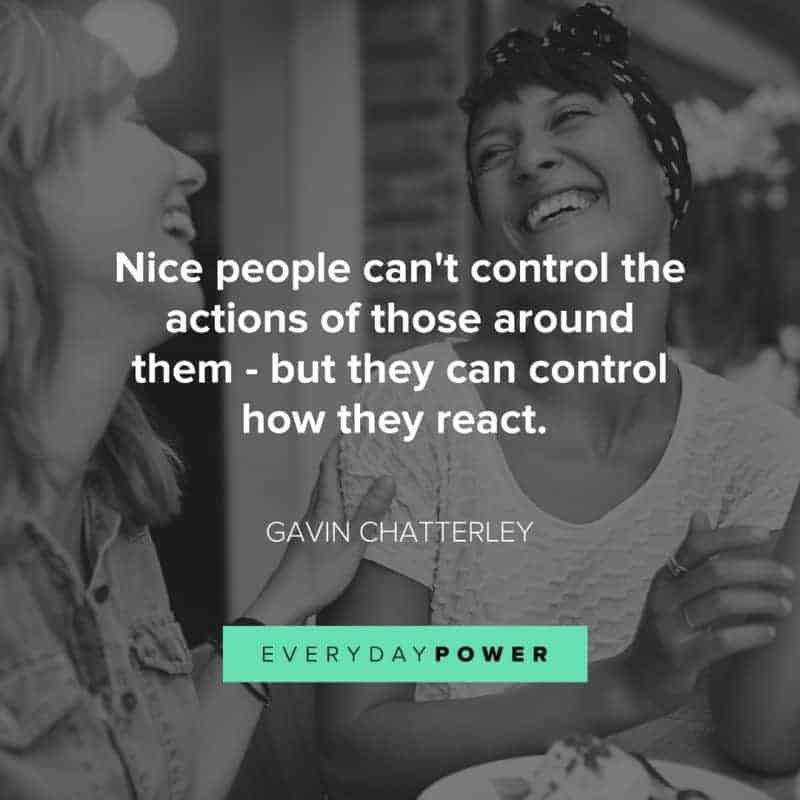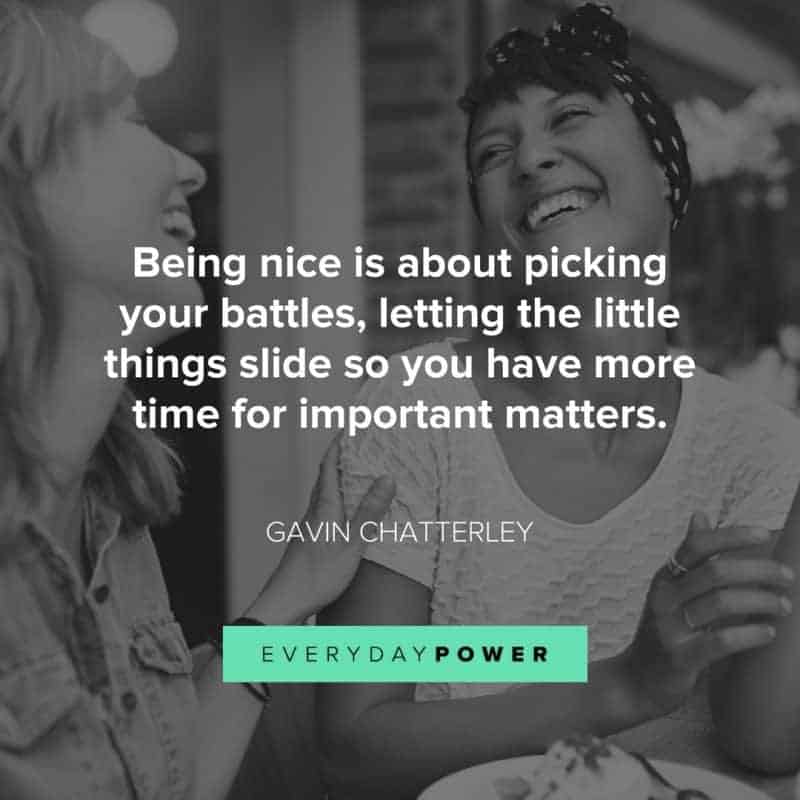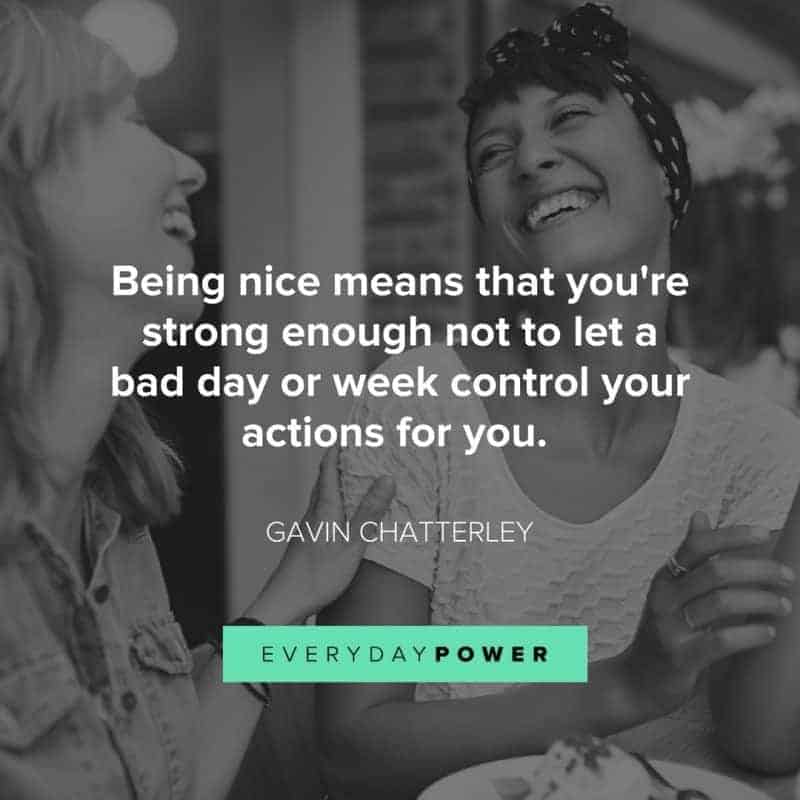4 Why Being Nice Doesn’t Mean You’re Being Weak
Being nice can be a bad thing.
If people know you’re a pushover, they’ll walk all over you all day.
You’ve probably heard these things before.
The idea is that nice people don’t defend themselves.
They don’t get up in someone else’s grill when they’ve been slighted.
That turns them into an easy target.
Nice people don’t know how to compete.
They’re too afraid to go out and take what’s theirs.
They lack ambition.
The problem with that way of thinking is that it ignores what being nice really means.
It overlooks strengths that being nice bring to the table; things that will make it easier to be successful.
Is being nice really a bad thing?
A lot of people think that being nice is to acquiesce.
You have to bend over backwards to accommodate everyone else’s whims, take on tasks no one else wants, and meet every need but yours.
But that’s not true.
To truly appreciate niceness, you have to see it as a means to an end.
For me, that means focusing my energy on improving the welfare of those around me.
That can sound like acquiescence, but it isn’t.
‘Welfare’ is a broader concept than filling the needs of the moment.
It also takes the future into account and who’s going to benefit from it.
In this regard, let’s look at the reasons why being nice doesn’t equal being weak.
Why being nice doesn’t mean you’re being weak
1. You care about true welfare for others.

If you think about it, would it ever be in anyone’s best interest to have everyone around them do everything for them? Of course not.
That kind of environment would leave people weak and unable to care for themselves.
Setting individuals up for that situation isn’t nice at all.
Does it improve a person’s welfare to give them extra opportunities to take advantage of you?
No.
That just perpetuates the self-defeating cycle that keeps them from true success.
Sometimes, the nice thing to do isn’t to bend to the wishes of those around us, but rather, to hold firm boundaries that will push them to be better than they are.
Being nice means allowing them the personal growth they need.
When you’re truly a nice person, the boundaries you create are always communicated with respect and regard for the other person.
That takes more personal strength than simply bulldozing people with criticism, leaving someone else to pick up the wreckage.
It takes finesse to properly communicate firmness and positive regard.
It takes good judgment to know when to give in and when to take in tense situations, instead of trying to assert authority over every little thing.
But the nice ones know that the extra effort is worth it.
They know they will be able to get their short-term results without sacrificing critical relationships that build strong culture and sustainable growth.
They know that force is only a temporary solution that ignores the bigger picture.
2. You’re more flexible than others.

Adaptability to different needs and situations is a core skill of a nice person that amounts to a lot more than simply bowing to everyone else’s whims.
In general, it’s a valuable trait in life.
In the fast-paced world we live in, we need to be able to adjust our behavior based on changing circumstances.
If you think about it, being nice is another way of saying that you’re flexible to another person’s needs.
You take them into account and deal with them accordingly.
That isn’t a weakness at all!
What boss doesn’t want an employee who knows how to make smart adjustments to fit various situations?
When the world changes around us, we have two options: We can stay the same and hope that it will conform to what we want, OR we can change with it.
Nice people are willing to take the latter route.
They can’t control the actions of those around them – but they can control how they react.
3. Nice people know how to pick their battles.

Being nice isn’t about giving everything to everyone.
It’s about picking your battles, letting the little things slide so you have more time for important matters.
People who always demand constant obedience to their wishes eventually lose whatever willingness people around them may have had.
By learning to give a little more on the less critical issues, it’s more likely that our associates will give us their loyalty – which is what matters most.
That dynamic creates a less hostile work environment that slows turnover and fosters teamwork.
We need each other to complete our daily tasks.
To gain the cooperation of our companions, we can either choose to employ coercion or persuasion.
When niceness is done right, you can get people to comply without having to use force.
4. You have better control of your emotions.

Being nice means that you’re strong enough not to let a bad day or week control your actions for you.
It means being willing to give someone else the benefit of the doubt and not snap back at them, even when it seems like it’s warranted.
It means keeping your cool even when things heat up around you.
Those who choose NOT to be nice are showing that they are still stinging from wounds that haven’t completely healed yet.
The ironic fact is that, these people need kindness more than anyone else.
Being able to stay calm enough to be good to them is surely a great strength.
At the end of the day, kindness can have its disadvantages.
It can enable others to take advantage of people, or perpetuate self-defeating behavior.
But then, precaution and knowledge are important safety measures for any kind of powerful tool.
Ultimately, being nice is what you make it.
With good judgment and a proper understanding of the concept, kindness can be a great asset when working with people and building a culture of positivity, cooperation, and success.












Zara Kongwa
May 5, 2019 at 1:59 AM
Totally agree with all the points. Well written. Thank you
Melissa
April 10, 2019 at 6:59 PM
Thanks for writing this, it’s wonderful and refreshing!